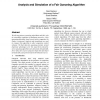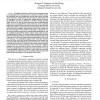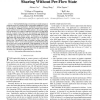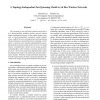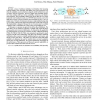117
click to vote
SIGCOMM
1989
ACM
15 years 6 months ago
1989
ACM
We discuss gateway queueing algorithms and their role in controlling congestion in datagram networks. A fair queueing algorithm, based on an earlier suggestion by Nagle, is propos...
112
click to vote
SIGCOMM
1996
ACM
15 years 6 months ago
1996
ACM
Hierarchical Packet Fair Queueing (H-PFQ)algorithms have the potential to simultaneously support guaranteed realtime service, rate-adaptive best-eort, and controlled linksharing s...
126
click to vote
MOBICOM
1997
ACM
15 years 6 months ago
1997
ACM
With the increasing popularity of portable wireless computers, mechanisms to efficiently transmit information to such clients are of significant interest. The environmentundercons...
133
Voted
INFOCOM
1998
IEEE
15 years 6 months ago
1998
IEEE
In this paper, we investigate the extent to which fair queueing (and its variants), in conjunction with appropriately tailored buffer management schemes, can be used to achieve th...
152
click to vote
INFOCOM
1998
IEEE
15 years 6 months ago
1998
IEEE
To support the Internet's explosive growth and expansion into a true integrated services network, there is a need for cost-effective switching technologies that can simultaneo...
111
click to vote
INFOCOM
1998
IEEE
15 years 6 months ago
1998
IEEE
While Packet Fair Queueing (PFQ) algorithms provide both bounded delay and fairness in wired networks, they cannot be applied directly to wireless networks. The key difficulty is t...
131
click to vote
INFOCOM
1998
IEEE
15 years 6 months ago
1998
IEEE
The objective of recent research in fair queueing schemes has been to efficiently emulate a fluid-flow generalized (weighted) processor sharing (GPS) system, as closely as possibl...
118
click to vote
INFOCOM
2000
IEEE
15 years 6 months ago
2000
IEEE
Abstract—Fair bandwidth sharing at routers has several advantages, including protection of well-behaved flows and possible simplification of endto-end congestion control mechan...
130
click to vote
ICNP
2000
IEEE
15 years 6 months ago
2000
IEEE
Fair queueing of rate and delay-sensitive packet flows in a shared-medium, multihop wireless network remains largely unaddressed because of the unique design issues such as locat...
108
click to vote
INFOCOM
2002
IEEE
15 years 7 months ago
2002
IEEE
— Recently, a class of solutions including Core-Stateless Fair Queueing (CSFQ), Rainbow Fair Queueing, and Diffserv have been proposed to address the scalability concerns that ha...
